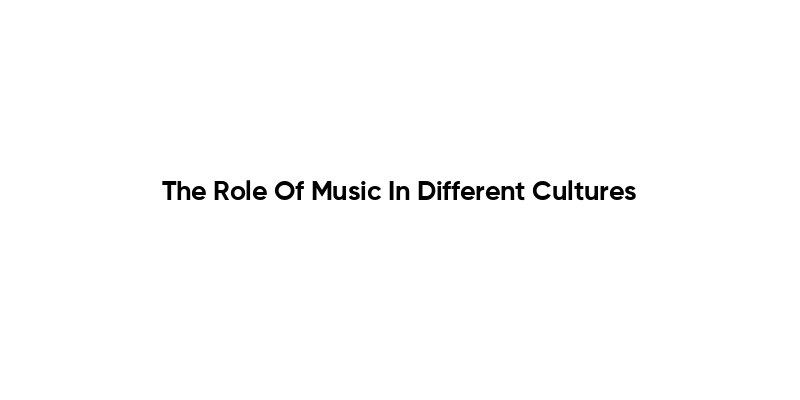Music is a universal language that transcends borders and connects people across diverse cultures. The role of music in different cultures is not merely for entertainment; it serves as a vital expression of identity, tradition, and community. From the rhythmic beats of African drumming to the melodic strains of Indian classical music, each culture has its unique soundscape that reflects its history, values, and social dynamics. Understanding the significance of music in various cultural contexts can deepen our appreciation for the rich tapestry of human experience.
In this article, we will delve into the multifaceted role of music in different cultures, exploring how it shapes social interactions, rituals, and celebrations. You will learn about the ways music acts as a vehicle for storytelling, preserving history, and fostering a sense of belonging among community members. Additionally, we will examine the influence of globalization on traditional music forms and how contemporary artists are blending genres to create new cultural expressions.
As we journey through the world of music, you will discover fascinating insights into the rituals and practices that define various cultures. From the haunting melodies of indigenous tribes to the vibrant sounds of modern pop, music continues to evolve while remaining deeply rooted in cultural identity. Join us as we uncover the profound impact of music on human connection and cultural heritage, and be inspired to explore the sounds that shape our world.
Music as a Tool for Cultural Identity
Music plays a crucial role in shaping and expressing cultural identity. It serves as a medium through which individuals and communities can convey their values, beliefs, and traditions. For many cultures, music is not just an art form; it is a vital part of their heritage that connects generations. Traditional songs often tell stories of historical events, myths, and legends, reinforcing a sense of belonging among community members.
In various cultures, music is used in rituals and ceremonies, marking significant life events such as births, weddings, and funerals. These musical expressions help to solidify cultural identity and foster a sense of unity among participants. For instance, Native American powwows feature traditional drumming and singing that celebrate their heritage and promote cultural pride.
The Influence of Music on Social Change
Throughout history, music has been a powerful catalyst for social change. It has the ability to raise awareness about social issues, inspire movements, and unite people for a common cause. Genres such as folk, rock, and hip-hop have often been associated with political activism, providing a voice to the marginalized and oppressed.
For example, during the Civil Rights Movement in the United States, songs like “We Shall Overcome” became anthems of hope and resilience. Similarly, protest songs in various cultures have played a significant role in challenging the status quo and advocating for justice. The impact of music on social change highlights its importance as a tool for empowerment and expression.
Music and Spiritual Practices
In many cultures, music is intertwined with spiritual practices and religious rituals. It serves as a means of connecting with the divine, facilitating meditation, and enhancing the overall spiritual experience. Sacred music, such as Gregorian chants, Sufi whirling, and African drumming, often plays a central role in worship and communal gatherings.
The use of music in spiritual contexts can evoke deep emotional responses, fostering a sense of transcendence and connection to something greater than oneself. In cultures around the world, music is seen as a way to communicate with the spiritual realm, making it an essential aspect of religious life.
The Role of Music in Education and Transmission of Knowledge
Music serves as an effective educational tool in many cultures, facilitating the transmission of knowledge and cultural values. Through songs, children learn about their history, language, and social norms. This oral tradition is particularly prevalent in indigenous cultures, where storytelling through music is a key method of preserving and sharing knowledge.
In addition to cultural education, music can enhance cognitive development and language skills. Research has shown that musical training can improve memory, attention, and even mathematical abilities. As such, incorporating music into educational curricula can enrich the learning experience and promote cultural awareness among students.
The Globalization of Music and Cultural Exchange
The advent of technology and globalization has led to unprecedented cultural exchange, with music being a significant aspect of this phenomenon. Genres such as reggae, jazz, and K-pop have transcended geographical boundaries, influencing and blending with local musical traditions around the world. This fusion of styles creates new genres and enriches the global music landscape.
However, the globalization of music also raises concerns about cultural appropriation and the loss of traditional practices. As cultures interact and influence one another, it is essential to approach this exchange with respect and understanding. By celebrating diversity and promoting cultural appreciation, music can continue to serve as a bridge between different communities.
Music is a universal language that transcends borders and connects people across different cultures. It plays a significant role in various aspects of life, including rituals, celebrations, and social gatherings. Below is a summary of the role of music in different cultures around the world.
| Culture | Role of Music | Examples |
|---|---|---|
| African Cultures | Music is integral to community life, often used in ceremonies, storytelling, and social functions. | Drumming in tribal ceremonies, call-and-response singing. |
| Indian Culture | Music is deeply connected to spirituality and is used in religious rituals and classical performances. | Hindustani and Carnatic music, Bhajans (devotional songs). |
| Western Cultures | Music serves as entertainment and a form of artistic expression, often reflecting social issues. | Pop concerts, classical symphonies, protest songs. |
| Indigenous Cultures | Music is a means of preserving history and culture, often linked to nature and ancestral traditions. | Native American powwow songs, Australian Aboriginal didgeridoo music. |
| Latin American Cultures | Music is a vibrant part of social life, often associated with dance and celebration. | Salsa, Tango, Mariachi. |
| Middle Eastern Cultures | Music is often tied to religious practices and cultural identity, featuring unique scales and rhythms. | Arabic maqam, Sufi music. |
In conclusion, music serves as a vital component of cultural identity and expression across the globe. It reflects the values, beliefs, and traditions of different societies, making it an essential aspect of human experience.



